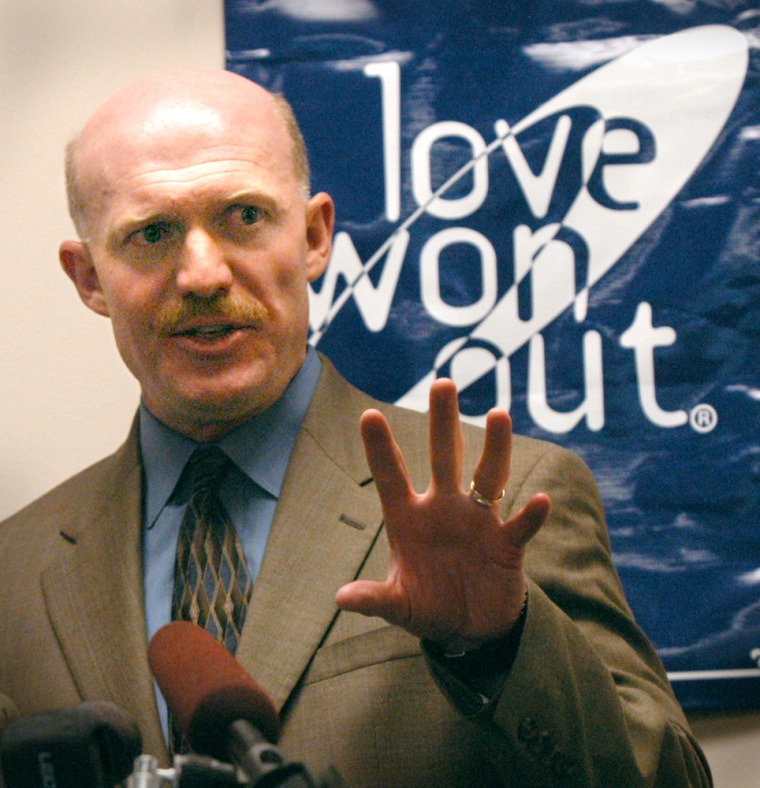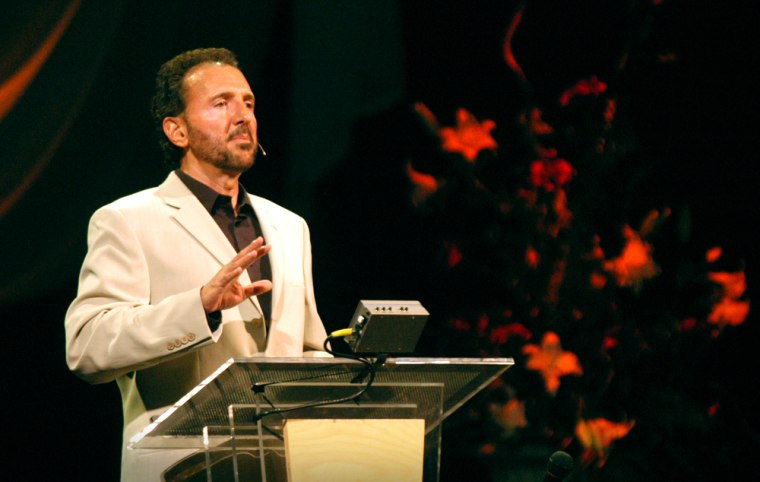BOTHELL, Wash. — At first glance, Mary Lou Wallner, a neat, grandmotherly registered nurse in her late 50s, seems an unlikely gay-rights activist.
That is until you know that Wallner’s daughter, Anna Wakefield, committed suicide in 1997, nine years after she came out as a lesbian to her mother, who was a conservative evangelical Christian. She was 29 years old.
Today, Wallner and her husband — Bob, Wakefield’s stepfather — travel the country preaching tolerance and love for gay men and lesbians as part of their ministry in Cabot, Ark.
The Wallners were among more than 1,200 people — a standing-room-only crowd of gay men, lesbians, relatives and friends — who gathered last weekend at a Baptist church outside Seattle to find out more about the contention that homosexuality can be treated and potentially reversed. The conference, called Love Won Out, was organized by Focus on the Family, the evangelical ministry founded by Dr. James Dobson, the psychologist whose Christian broadcasts are estimated to reach more than 200 million people.
“When [her daughter] did come out, it was very difficult for both of us, but particularly for me, because I did believe that it was a sin,” Mary Lou Wallner said. “Since her death, we have been on a journey to discover what really is the truth about homosexuality.”
‘Message of hope and healing’
From what they’ve heard, the Wallners vigorously disagree with the central tenets of Love Won Out. “I think Dr. Dobson is on a campaign to destroy the homosexual community,” Bob Wallner said.
Focus on the Family says it is doing everything it can to prove him wrong. It welcomed the Wallners and other representatives of gay and lesbian rights groups into its conference and did not confront them.

When activists “come in and hear the speakers, they are ... very surprised to hear a message of hope and healing and challenge to the church,” Dr. Bill Maier, vice president and psychologist in residence for Focus on the Family, said in an interview ahead of the conference.
But opinions are frequently dogmatic. Mike Haley, Focus on the Family’s manager of gender issues and a speaker at the conference, said some speakers had gotten death threats, a not-uncommon occurrence resulting from the three dozen events the organization has sponsored over the past decade or so.
In the end, only a handful of protesters showed up at the conference, which was held while most attention was turned toward Seattle’s annual Gay Pride Festival, and police reported no incidents.
A marriage of convenience
The idea that sexuality could be altered is one of the most controversial in modern psychology, so contested that different practitioners call it by different names, so nascent that partisans look at the same data and draw opposite conclusions.
Proponents of therapy to alter sexual orientation fall into two camps. While they share many philosophies — that homosexuality is a disorder triggered in childhood, often by damaged family relationships, and that it is not a choice but can be reversed — they have some notable differences.
The first camp, made up largely of evangelical counselors, many of whom say they have “left homosexuality,” comes at the topic from a religious stance. Guided by the Christian injunction to love the sinner but hate the sin, the ex-gay ministry preaches that the church should embrace homosexuals and guide them back to heterosexuality.
This philosophy is called “reparative therapy.” Inherent in that name is that homosexuality is something to be repaired — an idea that gay and lesbian activists consider insulting.
“Pretty is as pretty does, and actions speak louder than words,” said Harry Knox, founding director of religious and faith programs for the Human Rights Campaign, the nation’s largest gay-rights organization. “They are starting from the premise that homosexuality is a disorder that needs to be cured or changed. All of the [psychological and psychiatric professional] groups come down that it is not a disorder and trying to change is dangerous.”
A ‘homosexual problem’
The other camp is made up of psychologists and researchers who call their approach “reorientation” or “differentiation” therapy, terms notable for their neutrality. Seeing homosexuality as a treatable condition, they are an admittedly small minority in the psychological world, and they complain that they are marginalized by a professional establishment held hostage by pro-gay theorists.
All people are essentially born biologically heterosexual, proponents contend; some develop a homosexual problem. “Gay,” by contrast, is a social and political identity, Dr. Joseph Nicolosi, president of the National Association for Research and Therapy of Homosexuality, or NARTH, said during the conference.
Opponents, who accuse it of gay-bashing, sometimes mischaracterize NARTH as rejecting any predisposition to homosexuality. In fact, it does not contend that homosexuality is solely a sociological or psychological condition, tracking research that supports the supposition that biological factors can play at least a part, especially in the brains of male fetuses.
NARTH says it values diversity and agrees that “people who want to live their lives as ‘gay’ are free to do so.” In a 2000 scholarly paper, Nicolosi and two co-authors counseled that “conversion therapy is not appropriate for all clients,” warning that some who “wish to affirm a gay identity could feel shamed and emotionally hurt if therapists attempted to impose conversion therapy on them.”
By the same token, however, people who want to shed their “unwanted homosexuality” should be encouraged to seek treatment, Nicolosi said in an interview. “It’s not about sex,” he said. “It’s about a sense of self.”
Christian ties to the science
Christian-based reparative therapists draw extensively on the research of the scientific faction. Many psychological reorientation therapists say the two approaches are independent but may have some common cause.
Routinely, Nicolosi said, “reporters confuse ex-gay ministry” with reorientation or differentiation therapy. He said clients who bring a deep faith to treatment do have an advantage, though, because they are highly motivated and have a built-in support system.
NARTH is a secular organization, but it is only one of a number of exponents of homosexual reorientation. If you look more deeply at the wider field, you find a consistent religious strain to much of the literature.
One of the foremost authorities on sexual-identity change is Dr. Warren Throckmorton of Grove City College in Pennsylvania, former president of the American Mental Health Counselors Association. He is a leading proponent of the theory that sexual feelings are acquired through a variety of life experiences and can be flexible for many people. He believes counseling to bring sexual feelings in line with personal beliefs is an ethical alternative for people who are distressed by same-sex attractions, but he stresses that the pursuit of such counseling is solely an individual decision and should not be coerced.
Throckmorton is also co-chairman of the Sexual Orientation Task Force of the American Association of Christian Counselors and producer of a documentary, “I Do Exist,” that is distributed to religious institutions. A viewers’ guide that accompanies “I Do Exist” includes a brochure from Exodus International that says: “Therapy compliments one’s relationship with a local church, and is a part of the universal Church.”
Another widely cited source is the team of Dr. Stanton Jones and Dr. Mark Yarhouse, co-authors of papers and a book arguing that the prevalence of homosexuality is grossly overstated and that family and psychological factors are more important to its development than genetics.
Jones is provost of Wheaton College, the Christian institution in Illinois that boasts Billy Graham among its alumni, while Yarhouse is director of the Institute for the Study of Sexual Identity at Regent University, the Virginia college founded by the Rev. Pat Robertson. They identify themselves as evangelicals who are troubled by pressure on the church to depart from the Bible’s teachings on homosexuality.
Secular proponents of reorientation therapy, including NARTH, frequently cite the work of Throckmorton, Jones and Yarhouse, often divorced from their religious underpinnings.
Therapy finds an icon
They also herald the findings of Dr. Robert L. Spitzer of Columbia University, the odd man out in the circle of scholars most commonly quoted to support reorientation therapy. In 2001, Spitzer questioned 200 men and women who described themselves as former homosexuals and concluded that it was possible for a highly motivated gay man or lesbian to “achieve good heterosexual functioning.”
For advocates of reorientation therapy, Spitzer was a godsend. A self-described “atheistic Jew” who has long been known for his support of gay rights, Spitzer led the campaign to force the American Psychiatric Association to remove homosexuality from its list of mental disorders in 1973.
Spitzer’s study was embraced by both ex-gay ministries and secular proponents of gender-identification change as evidence that gay men and lesbians could alter their sexual orientation. He was also inoculation against critics’ characterization of their philosophy as cleverly disguised Bible-thumping.
But critics said Spitzer’s methodology was flawed, and Spitzer himself complained that his findings had been oversimplified.
“[T]o my horror, some of the media reported the study as an attempt to show that homosexuality is a choice, and that substantial change is possible for any homosexual who decides to make the effort,” he wrote in a Wall Street Journal commentary.
Can they meet in the middle?
The discussion over the nature of homosexuality is more complicated than you would be led to believe by the more vocal elements of conservative Christianity or the more confrontational gay and lesbian activists.
While they condemn the venomous diatribes of the Baptist minister Fred Phelps, proprietor of the tendentious Web site godhatesfags.com, nearly all American denominations also condemn homosexuality.
Likewise, several representatives of gay and lesbian activist groups consulted by MSNBC.com dismissed NARTH, Love Won Out and others as “hurtful,” “full of hate” and “anti-Christian.”
Along a spectrum in the middle are the minority of scientists who interpret research data as supporting the possibility that homosexuality is not immutable.
Then there are men and women of faith who read the Bible and see gays and lesbians as afflicted sinners who need God’s grace. But there are also men and women of faith who read the Bible and see gays and lesbians as children of God who should be accepted as such.
They are people like Bill Maier, who believes passionately that the church can make a fundamental difference in the lives of gays and lesbians but who is also chagrined by the “vile terms” that have characterized the church’s historic stance. “The church has often fallen short when it comes to the homosexual community,” he said.
Maier is a vocal leader of Focus on the Family’s campaign against same-sex marriage while stressing that violence against gays and lesbians is always wrong, and he has suggested that the extension of reciprocal benefits for same-sex couples may be an acceptable compromise as long as they are similarly extended to all other pairs who are not allowed to marry — that is, as long as they are not based on the couple’s sexuality.
“The church needs to repent of some of its past behavior,” Maier said.
And they are people like Harry Knox of the Human Rights Campaign, a gay man and former United Methodist minister who is also passionate in his faith.
“The assumption that we are immoral and that we are disordered is wrong, and if they are now being more ambiguous about their message, it’s because they and others among Christians in the country are wrestling with the ambiguity that comes from a faulty assumption,” Knox said.
“I’m glad they’re having to wrestle with it, and I’m certainly glad for anyone to say out loud that gay people should be protected,” he said.
“But I would just not trust the messenger. They have proven themselves to be disingenuous where gay people are concerned.”
MSNBC.com’s Robert Hood contributed to this report.
